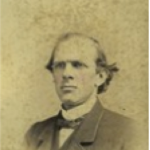Welcome to Humanities 100: Digging into the Digital! This new course is designed as a project-based introduction to digital humanities tools and methods of analysis.
Our subject this term is James Merrill Linn, one of the first graduates at Bucknell (class of 1855) and a captain in the Grand Army of the Republic during the American Civil War. Linn’s family left his life papers to Bucknell’s Archive. Because of the sheer quantity of notes, diaries, letters, drawings, business accounts and documents we can only focus on a small sliver of Linn’s life. We will therefore address a period of two months during 1862 when Linn took part in a military campaign in North Carolina under the leadership of General Ambrose Burnside.
In order to make sense of this period in Linn’s life, when he wrote almost daily to his family back home and kept track of his experiences and observations in a personal and regimental diary, we will rely on a variety of digital tools and approaches, including textual and visual analysis and mapping. Some of these approaches will seem familiar to you, while others might appear unusual or alien. More and more, however, we are using digital methods to negotiate the world around us. And humanities scholars are incorporating these approaches into historical, cultural, and literary research in ways that weren’t even considered possible a generation ago.
Very few people have even looked at Linn’s papers, let alone tried to make sense of his experience as a Lewisburg resident in the 19th century. As a student in this course you will act as a digital pioneer, learning to interpret and present these documents to the world.
